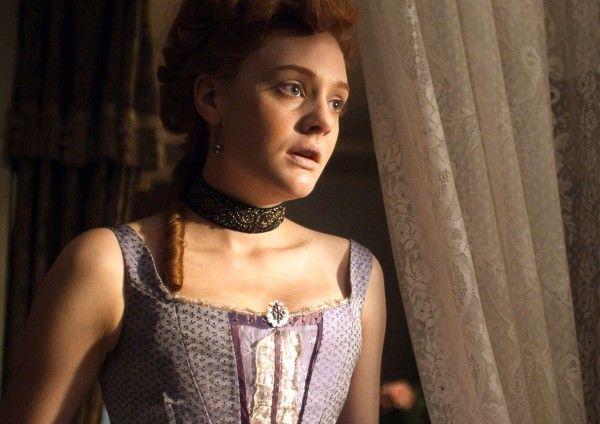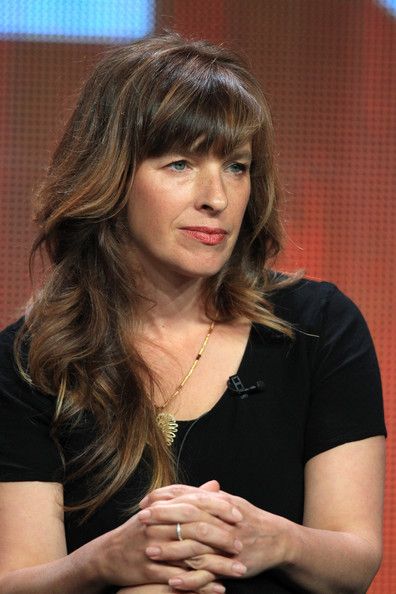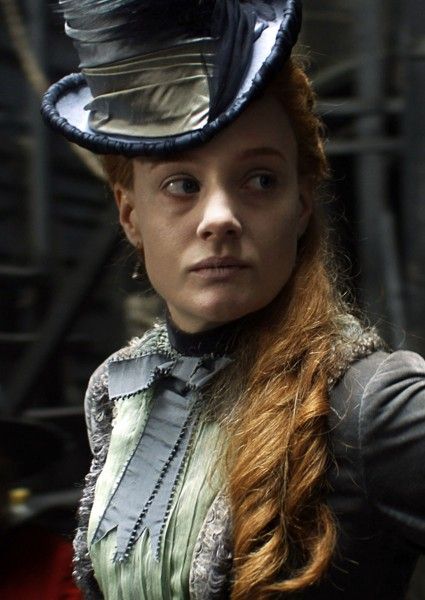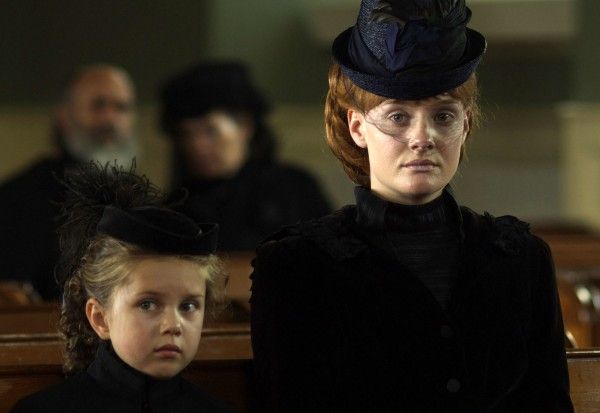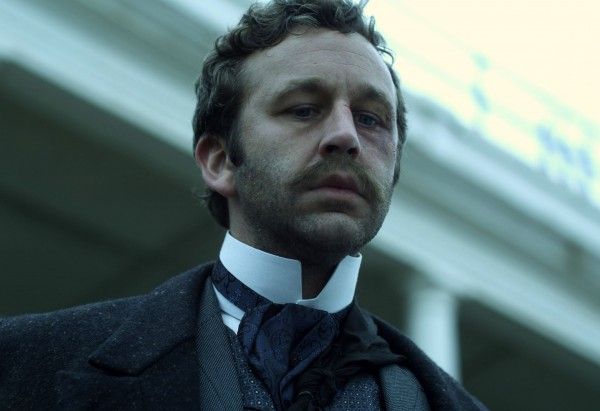Set in Victorian London, the four-part drama The Crimson Petal and The White, adapted from the book by Michel Faber, is a tale of seduction, power and class conflict centered around a vibrant, intelligent and sexually adept prostitute, named Sugar (Romola Garai). When Sugar meets wealthy businessman William Rackham (Chris O’Dowd), he is intrigued by everything she brings to his dreary existence, but as their relationship grows deeper, it also becomes more dangerous.
During this recent exclusive interview with Collider, screenwriter Lucinda Coxon talked about her journey in bringing The Crimson Petal and The White to life, fitting so much story into four hours, the changes that needed to be made in order to translate from page to screen, how much the music and production design add to the overall story, how writing this made her grateful that she wasn’t a woman in that time period, how fantastic she thought all of the performances were, and how nervous she was about the sex scenes. She also talked about what led her to be a screenwriter, and what she’s working on now. Check out what she had to say after the jump.
Collider: How did you come to this project? Had you been familiar with the book and wanted to adapt it, or did they come to you with the idea?
LUCINDA COXON: Both, actually. I had been approached about adapting the book a long time ago, as a film in the States, in 2002 when it first came out. That didn’t work out for anybody, and thankfully for me. So, when the rights eventually lapsed, they were picked up in the UK by a guy called David Thompson, who runs Origin Pictures, and he had been the exec on a film I had written a few years earlier, so he called me about it. But, quite a long time had passed, in between. It was 10 years on, really. He said, “There’s this book called The Crimson Petal and The White,” and I said, “Yes, I know about that book.” It was funny because it was one of those great instances of, if you leave things alone for long enough, it all comes out in the wash. So, the book floated back into grasp. I re-read it and I had a very different reaction to when I’d read it previously. I felt, “I have to adapt this. I absolutely have to be the person who does this.” I felt very strongly about it, and went and had this rather embarrassing meeting with David where I begged. I just informed him that it was necessary that I did the job. And I knew that he was talking to a couple of other people about it, so I said, “Look, I know you have to see these other people ‘cause they’re coming today and you can’t cancel them now, but you and I have to agree, between us, that I’m doing it anyway. You have to see them. I get that. But, I’m not leaving until you agree.” So, he very sweetly did agree.
I really wanted to do it because I just felt as though I understood how to do it, in a way I hadn’t previously. Previously, I had thought, “It’s an extraordinary book, but I don’t know how you’d do it.” This time, I just thought, “I know exactly what this needs to be.” I could just see it, and that was partly about being older and more experienced. Also, I had a daughter who was 10 by then. I re-read the book and thought, “My god, the book is so much about parenting – bad parenting and re-parenting yourself by parenting someone else.” That section where Sugar (Romola Garai) has to become a source of parent to Sophie (Isla Watt), even though she’s terrified of the prospect and certainly had no role model for being a parent, but has to learn how to do it, she re-parents herself and becomes vulnerable, in the process. I thought that was just great. The problem with the book, in the past, was that it was always a clever, incredibly witty and had a huge story, but there was this question of, “Where does the emotional heart of it lie?” As a love story, that’s not going to work with William (Chris O’Dowd) and Sugar. It is a love story, but it’s a love story between Sugar and Sophie. That became the prism through which I approached the adaptation, and that made it relatively simple for me.
Did you have the freedom to make this as long as you needed it to be? Did you determine that it would four parts, ahead of time?
COXON: Yeah, we did determine the four-part thing ahead of time. Sometimes we wished we’d gone to five, actually. Now, I really think it would have been impossible to do as a two-hour movie. It’s like, “What was I thinking?!” I do thank god I never got that job. I would have gotten fired quite fast, I think. It would have been impossible. There was more story between Henry (Tom Georgeson) and Mrs. Fox (Shirley Henderson) that might have been nice to explore, and every now and then we had to trim a bit of Mrs. Castaway (Gillian Anderson) and it would just break my heart. But, on the other hand, what’s great about it is that, with that compression, you get a real urgency of story. It really does feel as though the pages are flying by, when you watch it. I think that’s very gratifying for the viewer. I think it’s great they’re showing two episodes here, per night. It’s great to watch back-to-back, like that. You get to the end of the first one and you think, “My god, what’s going to happen next?!,” which is not the same with every period drama. It’s a psychological thriller, and it happens to be Victorian.
Were there major changes that you had to make to the material in the book, in order to translate it for the screen?
COXON: There wasn’t a lot. Obviously, there were things that we could show instead of telling, and lots of that sort of thing. I felt a tremendous burden and responsibility in adapting it. I knew that it took Michel Faber, the writer, 20 years to write the book. He had no involvement with the process that we were involved with, and he didn’t want any involvement. I think he was braced for the worst, and I was very determined to deliver something that he wouldn’t hate and be disappointed in. If I made real changes, I was very conscious of doing them. There were very few, actually. The one that really sticks in my mind is that, at the end of the novel, there’s a male character who tries to stop Sugar in her tracks and force her to have sex with him. In the novel, she allows him to have sex with her, in order to escape. And when I came to write the scene in the show, I just couldn’t bare it. I couldn’t do it. I just thought, “I’m sorry, that life is over now. We’re done with that.” So, she finally enacts the revenge that she’s been writing so much about, but never following through on. I thought, “I’m sorry, he’s going to just have to take a hit and she’s going to spring off without having to submit to him.”
In terms of the drama, it was just necessary that we understood that she had moved on, things had changed and she was entering a new phase. I really felt that we needed to signal that. So, there were moments like that, but they were really just about the momentum of the drama, from time to time. There were very few occasions like that. There was a lot of compression and obviously some re-ordering, but in the main, I tried not to actually change the writer’s intention because it’s a great book and you’ fiddle with it at your peril. It was really a question of, “How can I deliver the best version of the book?” Sometimes you adapt things that sort of need fixing. This didn’t need fixing. There were lots of things that had to go, but there was a core in the writing that is, in some ways, expressed much more vividly on screen than it is in the book, simply because it’s foregrounded. We foregrounded a lot of the emotional life of the book, and we found non-verbal ways to illustrate a lot of the fantastic writing in the book. We found visual, musical and design ways to express a lot of that stuff.
What do you think the music and production design adds to the final product?
COXON: The music is fantastic. Cristobal Tapia de Veer is absolutely brilliant. When the music first kicks in, you think, “God, what’s this? What are we listening to?” I think it’s so great that it’s not Victorian. And the sound design is really groundbreaking. It’s beautifully sculpted, in that respect. It’s fantastic! I felt so privileged that they delivered this version of it and that the designers were so passionate about it.
There’s so many levels of design detail in it. I remember talking to Annie Symons, who designed the costumes, which are very extraordinary. I said, “I love that outfit that she wears,” and she said, “It’s great, isn’t it? And you know all that fringing on the edge? That’s human hair.” I said, “Oh, my god, you’re kidding?!,” and she said, “No, it’s really creepy, isn’t it?” There was all of that detail in the design.
When I arrived on set one day, Grant Montgomery, who designed the show, said, “I want to show you Sugar’s book. I decided, at the beginning, that she wouldn’t have money for paper, so she’d have been writing on the backs of receipts and things.” So, first they created all these period receipts, and then they started writing out her book. It was just the most beautiful document. It was constructed with such love. They said, “She’d be tired, so her handwriting would change.” I was like, “Good grief!” When I wrote the stage directions, little did I know that somebody else would then spend three weeks constructing a prop. Just the attention to detail that accrues and piles up in the series is very unusual and it brings a huge amount of the texture that you get in the writing, so that I didn’t have to deliver that through exposition. We just never had to do that verbally.
Is it easy for you to take on this time period and this type of dialogue?
COXON: It was easy because Michel [Faber] had written so much of it. Also, it’s not a pastiche of the period. They’re all dying to talk, and they’re such strong characters that they all have their own way of talking. I think some of it is quite theatrical language. It’s a reality that’s heightened. I’m not trying to write a piece of Victorian naturalism. I’m not suggesting that that’s exactly what happened in those rooms, and that that’s the way they spoke. I don’t think that’s the case. It’s a very constructed world, so it’s easier. In fact, it’s very liberating, actually, to be able to play with those registers.
In writing this, did you have to understand each of the characters, or were some of them more challenging to figure out?
COXON: Actually, I find them all fantastically sympathetic in this, but that’s partly why you come to do the job. You fall in love. So, even when they behave badly and I’m disappointed in them, they’re still one’s children. I could certainly wish that some of them had behaved better, but they didn’t. I think they’re all very sympathetic and understandable, and I hope viewers do as well. One of the reasons that one feels so furious with William, in the end, when he takes the course of action that he takes is that he’s been so sympathetic earlier and he’s been a person who was almost capable of transcending himself. He was so close to being able to do that. We even like Sugar and invest in them, and think it might be possible. He’s just too weak. He’s not a cardboard villain. He’s a man who’s driven by his own demons and, in the end, he just can’t step up. He’s too befuddled by himself.
Did writing something like this make you grateful that you weren’t a woman in that time period?
COXON: Oh, for sure! That’s another reason it’s a really important story. The story feels very contemporary, in all kinds of quite interesting ways, but it’s also very good to be reminded that it’s not so long ago. That’s what happens when you don’t have equality. That’s what happens when you don’t have a welfare state, and there is no safety net anywhere, and you are just completely depending on other people rescuing you and saving you, and there are not so many of those people on the ground. That’s what happens when you can’t get a legal abortion. There’s a lot of violence against women in it, and clearly all kinds of violence. There’s straightforward violence with people getting beaten up, but there’s also medical violence by someone who thinks he’s doing the right thing. There’s a man who could sign a piece of paper and have his wife put in an asylum. There were all of those legal violences against women. So, I’m definitely very relieved to be here and now, but it’s good to have it all there, lest we forget.
What was it like for you to see these actors bring your words to life? Is that a strange, surreal feeling?
COXON: Yeah. Actually, the advantage with this was that I was pretty much still writing the last episode when they were starting to rehearse the first. There was an enormous rush to get it into production and all this enthusiasm for it, so it was all going very quickly. The other thing that was terrific for me was that a very good friend of mine, called Nina Gold, cast it. She is the best casting director in the UK. She cast The King’s Speech and Game of Thrones and Rome, and done lots of other casting for HBO. She’s cast every really terrific British film, for about the last 10 years. So, we asked her if she’d do it, and she said yes. She was the person who, at the beginning, said Chris O’Dowd. He was really known as a comedian in the UK, from the show The IT Crowd. We all furrowed our brows and went, “Really?! Chris O’Dowd?! That’s not what we were expecting!”
So, I have a huge amount of trust in her, and I had an enormous trust in the director. And I love Romola [Garai]. I had tried to work with Romola before, and it had never worked out. I was dying to work with her. Lots of the other actors, I hadn’t worked with before. Also, the script was what it was. This piece was an unusual little project. It was so vividly itself, and such a strong container that I thought it would all be fine. You wouldn’t say yes to doing it, in the first place, if you couldn’t step up to the challenges that it presented.
It’s unusual to work on a show where I just thought everybody was fantastic. Amanda Hale, who plays Agnes, was astonishing. Gillian Anderson is almost unrecognizable as Mrs. Castaway. There were all of the really extraordinary performances in the smaller roles, and then Romola and Chris. The joy of Romola and Chris, apart from how gifted they both are and how different they are, is that they both are very modern and they feel very contemporary. It’s odd that, in some ways, it feels like proper period because it really is dirty and you really can see how cold it would be in the winter and you can understand how dark it would be when you run out of candle and you can’t afford any more, but on the other hand, they feel very modern and the past does not feel like a foreign country because of that. They feel very real and contemporary and accessible.
Were there any moments or scenes that you were most excited about being brought to life, or anything you were most nervous about?
COXON: I’m thrilled with all the scenes at Mrs. Castaway’s brothel. We shot those in a really beautiful house in London, that’s the Dennis Severs’ house in East London. It’s a sort of museum, and we were allowed to shoot in. It’s a strange jewel box. That was great.
And I was concerned about the sex scenes because I was very anxious that they should not feel exploitative or prurient. I was very anxious that Romola was protected, as a performer, and that we approached them in a way that made sure we were telling the right story rather than staging something titillating. So, I was very relieved to see those emerge very clearly. They’re not decorative. I think you always know that she is masterminding her next move through those scenes. As a woman writing, you can’t put a woman naked in a show and not feel a sense of responsibility about that and not be concerned about what’s going on, in those scenes. The fact that we have Chris naked as well makes something for everyone. But, I was concerned about those scenes and I was very relieved when I saw them. It’s not pretty sex. There’s always a story to the sex. I was very happy with that, in the end.
I suppose the abortion scene also had me nervous. That was a big set piece, and it’s an unbearable bit in the story where your heart goes out to her. I found that quite difficult to watch because we know, by then, that this is a woman who has wanted this child. There’s a period where she thinks it’s going to work out and she wants it. And then, when she realizes that it won’t work out, she has to kill that hopeful bit of herself and it’s very difficult to watch her early attempts to do it. It’s that moment of, “Look away now, if you don’t have a strong stomach.”
Have you always wanted to be a storyteller, or did something inspire it?
COXON: I think I have always wanted to, but I wasn’t always conscious that it would be as a writer. I worked in the theater quite a bit before I went to college. I’d always loved the theater, and I began by writing plays. I still write plays. I work in the theater a lot in the UK, and I’ve worked in the theater out here quite a bit. That’s really where it began. Everything else – the films, and then Crimson – followed as a consequence of that, really.
Do you know what you’ll be doing next? Are you always working on something?
COXON: Oh, yeah! Well, since Crimson, I did a play in London, called Herding Cats, at the Hampstead Theatre. And then, I adapted a novel by (Welsh novelist) Sarah Waters. She’s been adapted for TV before, but not for film. I’ve adapted a novel of hers as a feature, that’s set in 1948 in England. It’s a very interesting supernatural psychological thriller set in a country house that’s either slightly haunted, or the result of hysteria. I’ve also done some work on a new play, and I just started work on a new series for David Thompson at Origin and the BBC. It’s something fresh and original, so we’ll see how that goes. I’m writing Episode 1, at the moment. That’s set in the second world war. Definitely, the next thing I do will have to be contemporary, or if I could just get to the ‘70s or something. If I could just drag my way forward, I wouldn’t mind getting up as far as the ‘70s or ‘80s, but contemporary would be ideal next. I want to try to go forward a bit for now. I’ll go back in a year or so, but not now. It’s too soon!
Do you like doing these really character-driven pieces, or could you ever see yourself writing one of these big high-concept stories?
COXON: No, that kind of high-concept writing just doesn’t interest me, and it’s not where my strengths lie. There are lots of people who are very good at that, and I think I’m not. I don’t work from the outside in, I work from the inside out. Those very high-concept movies just don’t interest me. Sometimes I enjoy watching them, but mostly not. Whereas these slightly dirty stories that are just about two people in a room together, both of whom are wanting to come out and talk, seems interesting to me. I want to stay close to the groove of people’s individual human stories. I can’t see that there’s anything more interesting than that. That’s just me. That’s what I do.
The Crimson Petal and The White premieres in two parts on Encore, on September 10th and 11th.

